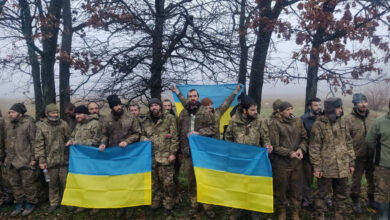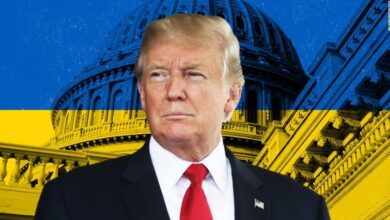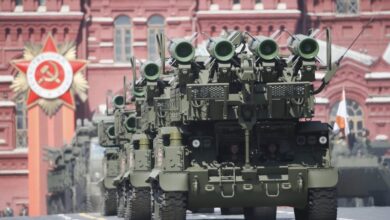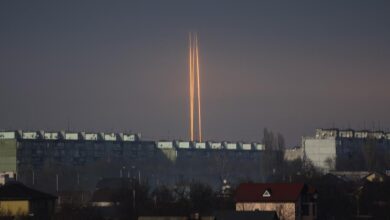North Korea Sending Soldiers to Aid Putin
North Korea is sending thousands of soldiers to help Vladimir Putin – a headline that’s sent shockwaves across the globe. This unexpected development dramatically shifts the geopolitical landscape, raising serious questions about the motivations behind Kim Jong-un’s decision, the potential impact on the war in Ukraine, and the broader implications for international relations. We’ll delve into the complex history between North Korea and Russia, exploring the potential military capabilities and logistical hurdles involved in such a massive troop deployment.
Get ready for a deep dive into this rapidly unfolding story.
The alleged deployment isn’t just a military matter; it has profound economic and social ramifications for North Korea itself. We’ll examine the potential strain on the already fragile North Korean economy, the impact on domestic morale, and the propaganda strategies the regime might employ to justify this controversial move. Ultimately, we’ll explore various scenarios and their potential consequences, painting a picture of the uncertain future shaped by this bold and risky gamble.
Military Capabilities and Logistics
The prospect of thousands of North Korean soldiers deploying to aid Russia in Ukraine raises significant questions about their military capabilities, the logistical hurdles involved in such a deployment, and the potential consequences for North Korea itself. While the DPRK’s military strength is often overstated in propaganda, a realistic assessment is crucial to understanding the implications of this potential intervention.The North Korean military, officially known as the Korean People’s Army (KPA), is a large but poorly equipped force.
Its strength lies primarily in its sheer manpower, with a reported active-duty strength of over 1.2 million personnel. However, much of this manpower is poorly trained and equipped with outdated weaponry. While they possess a significant number of tanks, artillery pieces, and infantry weapons, a large proportion are of Soviet-era design and lack modern technological advancements found in Western or even some Eastern European militaries.
Their air force is similarly outdated, and their navy, while possessing a large number of vessels, lacks the capabilities for blue-water operations. Combat readiness is a major concern; consistent training and adequate logistical support are lacking, especially in comparison to more advanced militaries.
North Korean Military Equipment and Readiness
The KPA’s equipment varies widely in quality and condition. Many of their weapons systems are aging and require significant maintenance, which is often hampered by economic sanctions and limited access to spare parts. While they have developed some indigenous weaponry, including ballistic missiles, the quality and reliability remain questionable, particularly in the context of a large-scale conventional conflict.
Their soldiers may be highly disciplined and ideologically motivated, but their training and experience in modern warfare are likely inadequate for the challenges presented by a conflict in Ukraine. The lack of modern communication and coordination systems would further hinder their effectiveness on the battlefield.
Logistical Challenges of Troop Deployment to Ukraine
Transporting a significant number of troops across thousands of kilometers to a warzone presents enormous logistical difficulties. North Korea lacks the capacity for large-scale, long-range airlifts. Their railways and roads are also in poor condition and lack the capacity to handle such a massive movement of personnel and equipment. The only viable option would be sea transport, likely involving a series of smaller vessels, making the operation vulnerable to interdiction by Western navies.
The process would be incredibly slow, expensive, and potentially dangerous, significantly extending the timeline and increasing the risk of casualties during transit.
Potential Deployment Routes and Methods
The most probable route for North Korean troops would be by sea, potentially through the Sea of Japan, across the Pacific Ocean, and then through the Suez Canal or around the Cape of Good Hope to reach a port in a country friendly to Russia. This journey would be lengthy and fraught with logistical challenges. The alternative, a land route through Russia, is also problematic, considering the distance, the condition of the infrastructure, and the potential for disruption.
Regardless of the chosen route, the sheer volume of supplies – food, water, ammunition, medical supplies, etc. – needed to sustain such a large force for an extended period in a combat zone presents a significant logistical nightmare.
Impact on North Korea’s Internal Security
Deploying a substantial portion of the KPA to Ukraine would significantly weaken North Korea’s internal security. This could create vulnerabilities to internal dissent, border incursions from South Korea, or even a potential coup attempt. The KPA’s presence is vital to maintaining the regime’s control over the population, and its depletion would increase the risk of instability within the country.
This is especially concerning given the already strained economic conditions and potential for social unrest within North Korea.
Resources Required for a Large-Scale Military Operation
The scale of resources required for such an operation is staggering. A successful deployment would necessitate:
- Massive quantities of food, water, and medical supplies.
- A vast amount of ammunition and weaponry.
- Extensive transportation capabilities, including ships, trains, and trucks.
- Sophisticated communication and coordination systems.
- Specialized training for troops in modern warfare techniques.
- Significant financial resources to cover all operational costs.
- Secure supply lines and logistical support throughout the deployment.
The challenges are immense, and the success of such an operation is highly questionable, given the DPRK’s current military capabilities and logistical limitations.
International Reactions and Sanctions: North Korea Is Sending Thousands Of Soldiers To Help Vladimir Putin
The alleged deployment of thousands of North Korean soldiers to aid Russia in its war against Ukraine has sparked a wave of international condemnation and raised serious concerns about the implications for global security and the existing sanctions regime targeting Pyongyang. The international community faces a complex challenge: how to respond effectively while navigating the pre-existing tensions on the Korean Peninsula and the broader geopolitical landscape.
International Responses to Alleged Troop Deployment
Reports of North Korean troop deployments have been met with varying degrees of official response. While definitive confirmation remains elusive, the mere suggestion has prompted swift and strong reactions from several key players. Many countries have expressed deep concern, emphasizing the potential for escalating the conflict in Ukraine and further destabilizing the region. The responses range from strongly worded statements of disapproval to threats of further sanctions.
The lack of a unified, global response, however, highlights the complexities of coordinating action against a rogue state amidst a pre-existing major international conflict.
Implications for Existing Sanctions Against North Korea
The alleged troop deployment significantly alters the calculus surrounding existing sanctions against North Korea. These sanctions, imposed over years due to Pyongyang’s nuclear weapons program and other destabilizing actions, are already complex and often circumvented. The provision of military support to Russia could provide justification for the international community to significantly strengthen these sanctions, potentially targeting additional North Korean entities and individuals involved in the troop deployment.
Furthermore, it could lead to a reassessment of the effectiveness of the current sanctions regime and the need for more robust enforcement mechanisms. A precedent of ignoring sanctions could embolden North Korea and other states to engage in similar behavior.
Reactions of Specific Countries
The United States is likely to lead the charge in imposing further sanctions and coordinating a multilateral response. Given the US’s strong commitment to supporting Ukraine and its long-standing concerns about North Korea’s nuclear ambitions, a forceful response is anticipated. South Korea, facing a direct threat from North Korea, is likely to express strong condemnation but may also seek to avoid escalating tensions on the Korean Peninsula.
China, North Korea’s key economic and political ally, faces a delicate balancing act. While publicly maintaining neutrality, China might quietly express its disapproval to Pyongyang to avoid further complications in its relationship with the West. However, China’s potential reluctance to fully support stronger sanctions presents a significant obstacle to a unified international response.
Categorization of Potential Responses
Potential responses can be categorized into diplomatic, economic, and military options. Diplomatic efforts might involve intensified engagement with China and other relevant parties to exert pressure on North Korea. Economic sanctions could involve freezing assets, imposing trade restrictions, and targeting individuals and entities involved in the troop deployment. Military options, while less likely given the risk of escalation, could involve increased military presence in the region or enhanced intelligence gathering.
The choice of response will depend on a complex interplay of factors, including the level of confirmation regarding the troop deployment, the ongoing situation in Ukraine, and the willingness of key actors to cooperate.
Impact on Global Efforts to Address the Conflict in Ukraine, North korea is sending thousands of soldiers to help vladimir putin
The alleged involvement of North Korea further complicates the already intricate dynamics of the Ukraine conflict. It could potentially prolong the war, provide Russia with additional manpower, and exacerbate the humanitarian crisis. Moreover, it could distract international attention and resources from efforts to achieve a peaceful resolution in Ukraine, diverting focus and potentially reducing the effectiveness of sanctions against Russia.
The situation underscores the interconnectedness of global security challenges and the need for a coordinated international approach to address these interconnected crises.
The potential deployment of North Korean troops to support Russia in Ukraine is a game-changer, injecting a new level of complexity into an already volatile situation. The implications are far-reaching, impacting global stability, international sanctions, and the internal dynamics of all nations involved. While the exact details remain shrouded in uncertainty, the very possibility of this alliance underscores the ever-shifting power dynamics on the world stage and the urgent need for careful observation and considered responses from the international community.
The coming weeks and months will be crucial in determining the full extent of this significant development and its cascading effects.
The news about North Korea sending thousands of soldiers to aid Putin is seriously unsettling. It makes you wonder how such a volatile situation would be handled, which leads me to think about the potential implications – and how drastically different things might be depending on who’s in the White House; check out this article on what a second trump presidency will bring for some perspective.
Ultimately, the North Korean troop deployment only highlights the precariousness of the global landscape and the urgent need for strong, decisive leadership.
The news about North Korea sending thousands of soldiers to aid Putin is seriously unsettling. It makes you wonder about global stability and the ripple effects on the world economy, which brings to mind a crucial question: how can we ensure responsible growth, especially considering the complexities highlighted in this insightful article on how to protect India’s shareholder capitalism from itself ?
Ultimately, the actions of rogue states like North Korea only amplify the need for robust and ethical economic policies everywhere.
So, North Korea sending thousands of soldiers to help Putin – crazy, right? It makes you wonder about power grabs and bypassing normal processes, which brings to mind the question of why Donald Trump was so keen to use recess appointments, as explained in this insightful article: why is donald trump keen to use recess appointments. Ultimately, both situations highlight a willingness to circumvent established norms in pursuit of political goals, whether it’s bolstering a war effort or pushing through controversial appointments.
The North Korean move is just another piece of this unsettling global puzzle.





